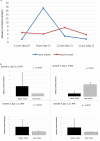Cortisol circadian rhythm and jet-lag syndrome: evaluation of salivary cortisol rhythm in a group of eastward travelers
- PMID: 33543430
- PMCID: PMC8263446
- DOI: 10.1007/s12020-021-02621-4
Cortisol circadian rhythm and jet-lag syndrome: evaluation of salivary cortisol rhythm in a group of eastward travelers
Abstract
Purpose: The activity of the hypothalamus-pituitary-adrenal axis plays a crucial role as an endogenous stress-reactive system. Lifestyle and work often interfere with the endogenous circadian rhythms and can modify the physiological patterns of stress-hormones secretion, including cortisol. We evaluated the cortisol circadian rhythm in the "jet-lag syndrome" that is the most known condition associated with the desynchronization of the circadian rhythm.
Methods: To assess the modifications of cortisol secretion after a long-haul flight, we compared baseline and post-travel salivary cortisol rhythm in a group of 28 healthy eastward travelers (from the U.S.A. or Canada to Italy). The salivary samples were collected about 1 week before the departure at 11 p.m. on day 0 and at 8 a.m., 12 a.m. (midday) and 11 p.m. on day 1 (R0). The same samples were obtained after the landing, the day they flew back home (R1).
Results: Statistical analysis showed a significant difference between R0 and R1 for each sample considered (p < 0.005). In particular, the post-travel salivary cortisol levels detected at 11 p.m. both on day 0 and on day 1, were significantly higher than at baseline. Post-travel morning salivary cortisol levels were lower compared with basal rhythm and increased during the morning, reaching the acrophase at 12 a.m.
Conclusions: In eastward travelers, crossing more than five time zones, the cortisol circadian rhythm after the return to the East "remained behind," being synchronized with the West time. This impaired cortisol secretion can contribute to the pathogenesis of the jet-lag syndrome.
Keywords: Cortisol circadian rhythm; Eastward travel; Jet-lag; Salivary cortisol.
Conflict of interest statement
The authors declare that they have no conflict of interest.
Figures

References
Publication types
MeSH terms
Substances
LinkOut - more resources
Full Text Sources
Other Literature Sources

